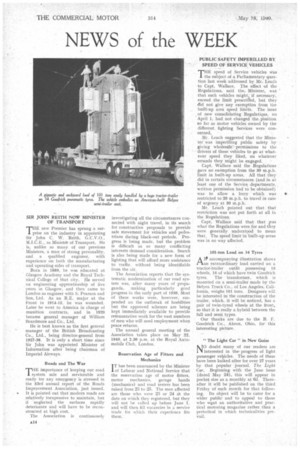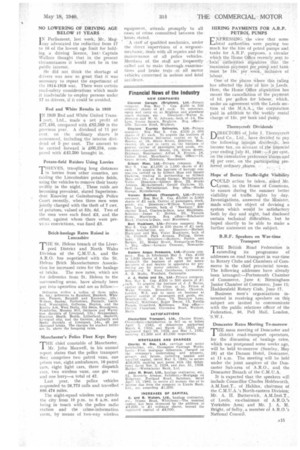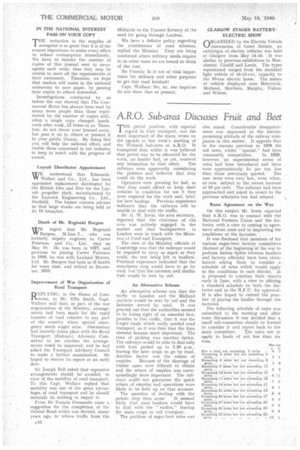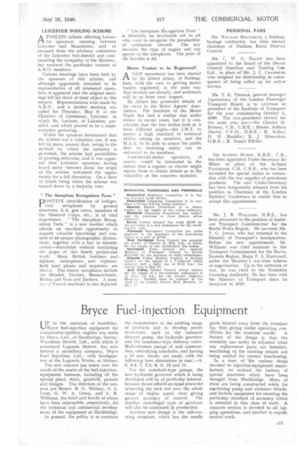NEWS of the WEEK
Page 16

Page 17

Page 18

Page 19

If you've noticed an error in this article please click here to report it so we can fix it.
SIR JOHN REITH NOW MINISTER OF TRANSPORT
THE new Premier has sprung a surprise on the industry in appointing Sir John C. W. Reith, G.C.V.O., M.I.C.E., as Minister of Transport. He is, unlike so many of our previous Ministers, a man of strong personality, and a qualified engineer, with experience on both the manufacturing and operating sides of transport.
Born in 1889, he was educated at Glasgow Academy and the Royal Technical College of that city. He served an engineering apprenticeship of five years in Glasgow, and then came to London as engineer with S. Pearson and Son, Ltd. As an R.E. major at the Front in 1914-15, he was wounded. Later he went to America in charge of munition contracts, and in 1920 became general manager of William Beardmore and Co., Ltd.
He is best known as the first general manager of the British Broadcasting Co., Ltd., being director-general from 1927-38, It is only a short time since Sir John was appointed Minister of Information after being chairman of Imperial Airways.
Roads and The Was
T"importance of keeping our road system safe and serviceable and ready for any emergency is stressed in the 53rd annual report of the Roads Improvement Association, just issued. It is pointed out that modern roads are relatively inexpensive to maintain, but if neglected the surfaces rapidly deteriorate and will have to he reconstructed at high cost.
The Association is continuously investigating all the circumstances connected with night travel, in its search for constructive proposals to provide safe movement for vehicles and pedestrians during black-out periods. Progress is being made, but the problem is difficult as so many conflicting interests demand consideration. Search is also being made for a new form of lighting that will afford more assistance to traffic, without being identifiable from the air.
The Association reports that the sys. tematic modernization of our road systern was, after many years of propaganda, making particularly good progress in the early part of 1939. Most of these works were, however, suspended on the outbreak of hostilities but the approved schemes are being kept immediately available to provide remunerative work for the vast numbers of men who will need employment when peace returns.
The annual general meeting of the Association takes place on May 22, 1940, at 2.30 p.m. at the Royal Automobile Club, London.
Reservation Age of Fitters and Mechanics IT has been announced by the Minister 1 of Labour and National Service that the reservation age of motor fitters, motor mechanics, garage hands (mechanics) and road testers has been raised from 23 to 25. The men affected are those who were 23 or 24 at the date on which they registered, but they will not be called up before June 1, and will then fill vacancies in a service trade for which their experience fits them.
PUBLIC SAFETY IMPERILLED BY SPEED OF SERVICE VEHICLES
THE speed of Service vehicles was the subject of a Parliamentary question last week addressed by Mr.. Leach to Capt. Wallace. The effect of the Regulations, said the. Minister, was that such vehicles might, if necessary, exceed the limit prescri&d, but they did not give any exemption from the built-up area speed liinits. The issue , of new consolidating Regulations, on April 1, had not changed the. position so far as motor vehicles owned by the different fighting Services were concerned.
Mr. Leach suggested that the Minister was imperilling public safety by giving wholesale' permissions to the drivers of these vehicles to go at whatever speed they liked, on whatever errands they might be engaged.
Capt. Wallace said the Regulations gave no exemption from the 30 m.p.h. limit in built-up areas. All that they did in certain circumstances (and in at /east one of the Service, departments„ written permission had to be obtained)
was to allow a lorry which was • restricted to 20 m.p.h. to travel in case of urgency at 30 m.p.h.
Mr. Leach pointed out that that restriction was not put forth at all in the Regulations.
Capt. Wallace said that that pas what the Regulations were for and they were generally understood to mean that. The speed limit in built-up areas was in no way affected.
10I-ton Load on 34 Tyres AND accompanying illustration shows an extraordinary load carried on a tractor-trailer outfit possessing 18 wheels, 16 of which have twin Goodrich tyres. The transformer, which is mounted on a semi-trailer made by the Belyea Truck Co., of Los Angeles, California, weighs 101 tons. Designers will be interested in the construction of the trailer, which, it will be noticed, has a pair of twin-tyred wheels at the front, so that it is really a hybrid between the full and semi types.
Our thanks are due to the B. F. Goodrich Co., Akron, Ohio, for this interesting picture.
"The Light Car " in New Guise
11‘ JO doubt many of our readers are CY interested in theprogress of light passenger vehicles. The needs of these have been looked after for over 27 years by that popular journal, The Light Car. Beginning with the June issue (dated May 24), this will appear in pocket size as a monthly at 6d. Thereafter it will be published on the third Friday of each month for that following. Its object will be to cater for a wider public and to appeal to those who want an authoritative and practical motoring magazine rather than a periodical in which technicalities prevail.
NO LOWERING OF DRIVING AGE BELOW 17 YEARS IN Parliament, last week, Mr. Mag nay advocated the reduction from 17 to 16 of the lowest age limit for holding a driving licence, but* Captain Wallace thought that in the present circumstances it Would not be in the public interest.
He did not think the shortage of drivers was now so great that it was necessary LG repeat the experiment of the 1914-1918 war. There were certain road-safety considerations which made it inadvisable to employ persons under 17 as drivers, if it could be avoided.
Red and White Results in 1939 I N 1939 Red and White United Trans port, Ltd., made a net profit of £77,416, compared with £82,589 in the previous year. A dividend of 11 per cent. on the ordinary shares is announced, including the interim dividend of 5 per cent. The amount to be carried forward is £66,234, compared with £43,590 brought in.
Potato-field Raiders Using Lorries THIEVES, travilling long distances in lorries from other counties, are raiding the Lincolnshire potato fields, using the velaiclesto remove their booty
swiftly in the night., raids are becoming prevalent, sated Superintendent Knowler at Gainsborough Police Court recently, when three men were jointly charged with the theft of 7 cwt. of potatoes, valued at 52s, 6d. Two of the men were each fined £3, and the other, against whom there were previces convictions, was fined £5.
Brick-haulage Rates Raised in Lancashire THE St. Helens branch of the Liverpool District and. North Wales Division of the C.M.U.A. and the A.R.O. has negotiated with the St, Helens Brick Manufacturers Association for increased rates for the haulage of bricks. The new rates, which are for deliveries from St. Helens to the surrounding areas, have already been put into operation and are as follow:— Deliveries within a radius of three miles, Bs. U.; deliveries to Rainford, Raydock, Whiston, Prescot, Rainhill and Knowsley, 10s.; Widnes, Sankey, Farlestown, Penketh, Latchford, Warrington, Colborne, Huyton, and the Knotty Ash, West Derby, Old Swan, Broadgreen, Fazakerley, Mosslejr Gateacre and Wavertree districts of Liverpool, 12s.; Grappenhall, Stockton Heath, Bootle, Litherland, Seaforth, Liverpool city, and the Gersten, Aigburth and Sucks districts of Liverpool, 14s., all per thousand bricks. The charges for stacked bricks are 3s, above the foregoing rates.
Manchester's Police Fleet Kept Busy
THE chief constable of Manchester, Mr. John Maxwell, in his annual report states that the police transport fleet comprises two patrol vans, one prison van, eight ambulances, 16 patrol cars, eight light cars, three dispatch cars, two wireless vans, one gas van and one lorry—a total of 42.
Last year, the police vehicles responded to 26,773 calls and travelled 886,474 miles.
The night-squad wireless van patrols the city from 10 p.m. to 6 a.m, and being in touch with the police radio station and the crime-information room, by means of two-way wireless equipment, attends promptly to all cases of crime committed between the hours stated.
A staff of qualified mechabics, under the direct -shpentision of a ergeantmechanic, deals with all repairs and the maintenance of all police vehicles. Members of. the _staff are frequently called out to make thorough, examinations and brake testsof: all motor vehicles concerned in serious and fatal ace idents.
HIRING PAYMENTS FOR A.R.P. .PETROL PUMPS
ENpRESSING the view that some local authorities were paying too much for the hire of petrol pumps and. tanks for A.R.P. purposes, a circular which the Home Office recently sent to loCar .stipidates that the maximtinipayMent per.,purnii.arid tank Must be 15s. per week, inclusive of
labour. • .
One of the 'plates Where this ruling has affected the rate of hire is Leeds. Here, the Home Office .stipulatiOn has meant the cancellation of the payment of Id. per gallon for labour,. which, under an agreement with the Leeds sec
tion of the the corporation paid in addition to• the Weekly rental charge of 15s. per tank and jump.
Thoroycroft 'Dividends"
DIRECTORS of John I. Tbotnycroft Land Co., Ltd., have decided to pay the following . interjin dividen-ds, less income tax, on accoant of At financial :year ending July 310940.: per .cent. on the cumulative preference Shargs-and per cent, on the participating preferred. ordinary„shares. •..
Hope of Better Traffic-light Visibility COULD action be taken, asked Mr. Lyons, in the House of Commons, to ensure during the summer better visibility of traffic lights by day. Investigations, answered the Minister, made with the object of devising a system which would be satisfactory both by day and night, had disclosed certain technical difficulties, but he hoped shortly to be able to make a further statement on the subject.
B.R.F. Speakers on War-time Transport
'THE British Road Federation is I extending its programme of addresses on road transport in war-time to Rotary Clubs and Chambers of Commerce in the chief provincial towns. The following addresses have already been -arrangech—Portsmouth Chamber of Commerce, June 4; Birmingham Junior Chamber of Commerce, June 11; Huddersfield Rotary Club, June 17,
Business men's organizations interested in receiving speakers on thiq subject are invited to communicate with the public relations officer of the Federation, 50, Pall Mall, London, S.W. I .
Doncaster Rates Meeting To-morrow THLmass meeting of Doncaster and m district road-transport operators, for the discussion of haulage rates, which was postponed some weeks ago, will be held to-morrow (Sunday, May 19) at the Danum Hotel, Doncaster, at 11 a.m. The meeting will be held under the joint auspices of the Doncaster Sub-area of A .R.O., and the Doncaster Branch of the C.M.U.A.
It is expected that the speakers will include Councillor Charles Holdsworth, A.M.Inst.T., of Halifax, chairman of the C.M.U.A.'s North-eastern Division; Mr. A. H. Butterwick, A.M.Inst.T., of Leeds, ex-chairman of A.R.O.'s Yorkshire Area: and Mr. J. A. M. Bright, of Selby, a member of A.R,O.'s National Council,
IN THE NATIONAL INTEREST PASS ON YOUR COPY THE reduction in the supplies of newsprint is so great that it is of the utmost importance to make every effort to reduce consumption immediately. We have to restrict the number of copies of this journal sent to newsagents each week; thus they may be unable to meet all the requirements of their customers. Therefore, we hope that readers will assist in the national endeavour to save paper, by passing their copies to others interested.
Investigations conducted by us before the war showed that The Commercial Motor has always been read by many more people than those represented by the number of copies sold; often a single copy changed hands, week after week, 12 times or so. There. fore, do not throw your journal away, but pass it on to others or present it to your public library. By doing this you will help the national effort, and enable those concerned in our industry to keep in touch with the progress of events.
Layrub Distributor Appointment
WE understand that Edmunds, YV Walker and Co., Ltd., has been appointed replacement distributor for the British Isles and Eire for the Layrub propeller shaft, manufactured by the La,ycock Engineering Co., Ltd., Sheffield. The former concern advises us that large stocks are being held at its 18 branches.
Death of Mr. Reginald Burgess WE regret that Mr. Reginald Burgess, Itil.Inst.T., who was formerly deputy engineer to Carter Paterson and Co., Ltd., died on May 10. He was born in 1877, and previous to joining Carter Paterson in 1908, be was with Leyland Motors, Ltd. Mr, Burgess had been in ill health for some time, and retired in December, 1938.
Improvement of War Organization of Road Transport REPLYING, in the House of Cornmons, to Mr. Ellis Smith, Capt. Wallace said that, as part of the war organization of the Ministry, arrangements had been made' for the rapid transfer of road vehicles to any part of the country where special emergency needs might arise. Discussions had recently taken place with the Road Transport (Defence) Advisory Committee to see whether the arrangements could be improved, and he had asked the Transport Advisory Council to make a further examination. He hoped to receive its report at an early date.
Sir Joseph Nall asked that expensive arrangements should be avoided, in view of the mobility of road transport. To this Capt. Wallace replied that mobility was one of the great advantages of road transport and he should certainly do nothing to impair it.
From Sir Francis Fremantle came a suggestion for the completion of the Orbital Road which was devised, many years ago, to relieve traffic from the
Midlands to the Thames Estuary of the need for going through London: We have a definite policy regarding the continuance of road schemes, replied the Minister. They are being continued where military needs.require it: in other cases we are bound to think of the cost.
Sir Francis: Is it not of vital importance for military and other purposes to get this road finished? Capt. Wallace: No, sir, our inquiries do not show that at present.
GLASGOW STAGES BATTERYELECTRIC SHOW nRGANIZED by the Electric Vehicle Association of Great Britain, an exhibition of electric vehicles was held• at Glasgow from May 14-16. It was similar to previous exhibitions in Manchester, Cardiff and Leeds. The types represented ranged from the standard light vehicle of 10-12-cwt. capacity to the 10-ton electric horse. The makes of vehicle displayed were Metrovick, Midland, Morrison, Murphy, Vulcan and Wilson.
LEICESTER POOLING SCHEME
A POOLING scheme affecting Leices:A ter operators running between Leicester and Manchester; said to
emanate from the advisory committee of the Leicester Sub-district and com manding the sympathy of the Ministry, has received the particular interest of A.R.O. members.
Various meetings have been held by the sponsors of this scheme, and although apparently intended to be representative of all interested operators, it appeared that the original meetings fell far short of their object in this respect. Representations were made by A.R.O., and a further meeting was called for Thursday, May 9, at the Chamber of Commerce, Leicester, at which Mr. Latham, of Leicester, presided, and which proved to be a representative gathering.
Whilst the sponsors maintained that the scheme was a voluntary one, it was felt by many present that, owing to the method by which the industry is governed, the scheme had possibilities of proving otherwise, and it was apparent that Leicester operators having heard many rumours about the origin of the scheme welcomed the opportunity for a full discussion. On a show of hands being taken the scheme was turned down by a majority vote.
"The Aeroplane Recognition Tests"
POSITIVE identification of belligerents' aeroplanes by ground observers, A.A. gun crews, members of the Observer Corps, etc., is of vital importance. "The Aeroplane Recognition Tests" is a new booklet which affords an excellent opportunity to acquire valuable knowledge and consists of 44 unique photographic illustrations, together with a key to identification—detachable without mutilating the pages of this bandy pocket-size work. Many British bombers and fighters, monoplanes and biplanes, both land planes and seaplanes. are shown. The enemy aeroplanes include the Heinkel, Dornier, Messerschmitt, Blohm and Voss and Junkers. A number of French machines is also depicted.
" The Aeroplane Iiecognition Tests" is definitely an invaluable aid to all who nant to recognize the peculiarities of combatant aircraft. The key includes the type of engine and top speeds of the aeroplanes. The price of the booklet is 6d.
Motor Traders to be Registered? ,
A:NEW movement has been started by Sir Albert Atkey, of Nottingham, with the view to getting motor traders registered, in the same way that dentists are already, and architects will be as from next August.
Sir Albert has presented details of his views to the Motor Agents' Association, The Institute of the Motor Trade has had a similar aim under review in recent years, but it is conceivable that the two bodies look at it from different angles—the I.M.T. to ensure a high standard of technical ability among its members, and the M.A.A. to be able to assure the public that its motoring safety can be entrusted to its members.
Commercial-motor operators, of course, would be interested to the extent that a register or charter might enable them to obtain details as to the reliability of the concerns included.




















































